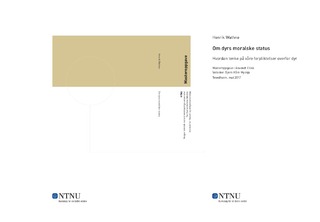| dc.description.abstract | The question of the moral status of animals is a central problem in animal ethics. A range of questions arises when discussing the moral status of animals. How should we understand the concept of moral status? What kind of considerations should we consider when determining the moral status of animals? How are we to approach the question of animals’ moral status? Inthis thesis I set out to explore and answer these questions.
An influential thesis is that animals’ moral status is wholly grounded in their capacities. This is what James Rachels has called moral individualism. Two central proponents of this thesis are Peter Singer and Tom Regan. According to Peter Singer, because many animals are sentient, they deserve to be treated according to the principle of equal consideration of interests. Moral agents are therefore obligated to take into account the interests of all sentient animals affected by an action and act according to what will produce the optimal net satisfaction of interests, whether it be human or animal. Tom Regan, on the other hand, proposes what he calls the subject-of-a-life criterion for moral status. Operating within the framework of rights, he claims that all beings satisfying the subject-of-a-life criterion possesses a moral right to respectful treatment.
The major focus of both Singer and Regan have been to criticise how humans use animals for purposes such as food or in scientific experiments. Their moral theories have therefore been shaped around the question of what moral wrongs are being commited by the way humans harm animals. This explains why animal capacities are such a central element of their theories. In later years, however, questions about what our moral responsibility to assist wild animals are, has been much debated. In particular is the question of whether humans are morally obligated to prevent predators to hunt, kill and eat prey animals. There is a common intuition that we are not obligated to prevent predators from killing their prey. It has therefore been considered a reductio ad absurdum of a moral theory if it implies such intervention. Both Singer and Regan argues that their theories do not imply this. In the case of Singer, however, it does not seem that he can maintain such a position. Regan’s theory, on the other hand, can maintain such a position, but his theory then runs counter to another common intuition: that we have a special obligation to save humans in analogous situations as prey find themselves in. Arguing on the basis of these two intuitions, I claim that something more is needed to establish what moral obligations we have to assist animals.Based on Clare Palmer’s moral theory, I argue that certain relations are an important consideration when determining duties of assistance. This implies that moral individualism is unsustainable. | nb_NO |

